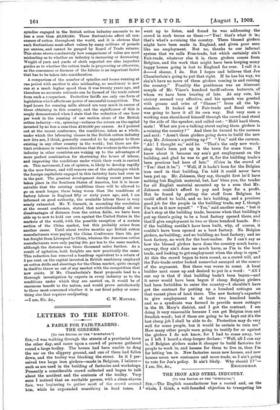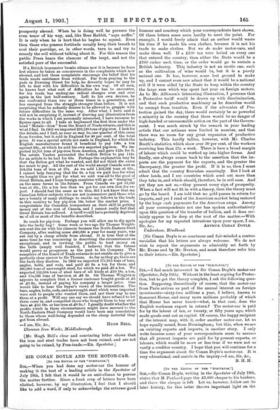THE IRON AND STEEL INDUSTRY. [TO THE EDITOR OF THE
"Sescreroa."1 Sul,—The English manufacturer has a rooted and, on the whole, I think, a well-founded objection to trumpeting his
prosperity abroad. When he is doing well he pursues the even tenor of his way, and, like Brer Rabbit, "says nuffin." It is only when he is hurt that he begins to squeal. Even then those who possess fortitude usually keep their breath to cool their porridge, or, in other words, turn to and try to remedy the evil without talking about it. For this reason the public Press hears the clamour of the inept, and not the satisfied.pinT of the successful.
If a British ironmast,er breaks silence now it is because he fears lest silence be taken as concurrence in the complaints which now abound, and lest these complaints encourage the belief that his trade needs assistance from without. Far from praying to the gods in Downing Street for help, he devoutly hopes he may be
• left to deal with his difficulties in his own way. Of all men, he knows best what sort of difficulties he has to encounter, for his trade has undergone radical changes over and over again in the last half-century. Left to his own devices, he has confronted them two or three times in a generation, and has emerged from the struggle stronger than before. It is not surprising that he ardently desires to be allowed to grapple with future difficulties in the same way. After what I have said it will not be surprising if, instead of drawing any illustration from the works in which I am personally interested, I have recourse to figures open to all. I take at haphazard the first item under the head "Metals—Iron" from the Board of Trade returns, and this is what I find. In 1902 we imported 223,138 tons of pig-iron. I look for the details, and I find, as near as may be, one quarter of this came from Sweden, but it sold in England for 40 per cent, of the total price. It was a special article not made in England, for which the English manufacturer found it beneficial to pay 106s. a ton against 636., at which he sold his own exported pig-iron. We im- ported 10,701 tons of pig-iron from America, and gave 112s. for it. The astute Yankee persuaded the foolish Briton to pay 112s. for an article to be had for 63s. Perhaps the explanation may be that the Briton got what he wanted, and did not think 49s. extra too much to pay. All the rest of the world except Canada sent us 104,554 tons of iron at 57s. As we sold 1,102,566 tons at 63s., I cannot help fancying that the 6s. a ton we paid less for what we bought than we got for what we sold was all to the good of Great Britain, and I hope foreign countries will go on "dumping" on the same terms in the future. From Canada we got 51,041 tons at 45s., 18s. a ton less than we got for our own iron for ex- port. I should feel the same as to this, did I not know that my Canadian fellow-subjects who are not ironmasters paid those who are a bounty of many shillings to enable my fellows in the trade in this country to buy pia-iron 18s. below the market price. I congratulate the Canadian ironmasters on their skill in getting money out of the rest of Canada, and I cannot really feel that Great Britain has suffered. A tariff would have probably deprived us of all or most of the benefits described.
So much for pig-iron. Perhaps you will allow me to dip again into the lucky bag? Some week or two ago Sir Thomas Wright- son rent the air with his clamour because the North-Eastern Steel Company, after making some .e40,000 a year for many years, was cut out by a cheap article from abroad. It is true that at the same time he was concurring in describing the circumstances as exceptional, and in inviting the public to lend money on the faith (amply well founded, I believe) that the future would prove as prosperous RS the past to his Company. The compilers of the Board of Trade returns do not enable me to give a perfectly clear answer to Sir Thomas. As far as they go, these are the facts they disclose. In 1902 we imported 171,915 tons of bars, angles, bolts, and rods, and paid .9.6 6s. a ton for them, and 280,998 tons of unwrought steel, for which we paid .f.5 a ton. We exported 152,694 tons of steel bars of all kinds at ..£10 18s. a ton,
and 114,536 tons of bar-iron at 3s. Sir Thomas Wrightson appears to complain that a former customer bought goods at .e5 or £6 6s., instead of paying his company a larger price. One would like to hear the buyer's views of the transaction. The bars, angles, bolts, rods, and unwrought steel which were imported were sent to people who wanted them, and saw their way to use them at a profit. Will any one say we should have refused to let them come in, and compelled those who bought them to buy steel bars at £10 18s. or bar-iron at .e8 3a.? I greatly doubt whether the profits which in these circumstances might have accrued to the North-Eastern Steel Company would have been any consolation to those whose well-being depended on the cheap material they got from abroad.
—Jam, Sir, &c., HUGH HELL.
Clarence Iron Works, Middlesbrough.
[Mr. Hugh Bell's clear and convincing letter shows that the iron and steel trades have not been ruined, and are not going to be ruined, by Free-trade.—ED. Spectator.]







































 Previous page
Previous page